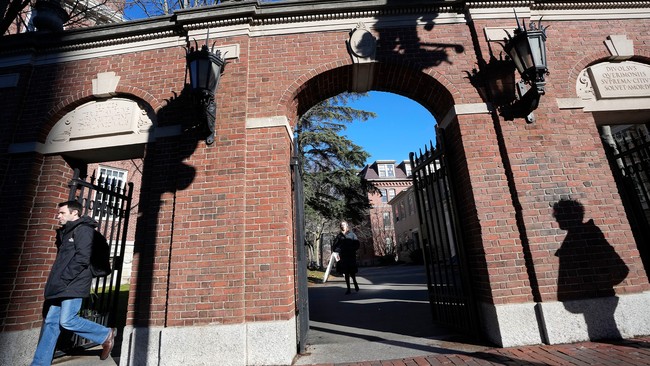
Earlier this month a Harvard Law School professor named Randall Kennedy called for the end of mandatory DEI statements, saying they made him “wince” and that they discredited the current “DEI regime.”
Candidates for academic positions at Harvard should not be asked to support ideological commitments. Imagine the howl of protest that would (or should) erupt if a school at Harvard asked a candidate for a faculty position to submit a statement of their orientation towards capitalism, or patriotism, or Making America Great Again with a clear expectation of allegiance? Such pressure constitutes an encroachment upon the intellectual freedom that ought to be part of the enjoyment of academic life…
By overreaching, by resorting to compulsion, by forcing people to toe a political line, by imposing ideological litmus tests, by incentivizing insincerity, and by creating a circular mode of discourse that is seemingly impervious to self-questioning, the current DEI regime is discrediting itself.
Yesterday the Atlantic’s Conor Friedersdorf noted that the Harvard Crimson had run a piece around the same time that was meant to present a pro-DEI statement for balance. However, when he spoke to Edward Hall, a Harvard philosophy professor and the author of that other piece, he found Hall was not actually defending the kind of mandatory DEI statements that exist now. Instead he was envisioning something more reasonable and less ideological. He suggested the following prompt for job applicants: “What do you do to foster a culture in the classroom in which students can engage in serious, good-faith, curiosity-driven disagreement?” He then offered this example of how different people might respond:
Say one applicant writes, Having delved deeply into research literature on authoritarian personality types, I feel the best way to minimize racial animus in classroom culture is to treat members of every racial group in a color-blind manner, because who we consider “other” is malleable and raising the salience of race could foster a climate that resulted in more minority students being othered.
Meanwhile, a competing job candidate writes, Having delved deeply into critical race theory, explicitly race-conscious approaches to classroom management strike me as vital for students of color to participate as equals in curiosity-driven disagreement…
“They both can’t be right, but they could both be excellent candidates, and they’ve signaled that by the seriousness with which they took the question,” Hall said. “I would probe for signs that they try to evaluate whether their approach is actually working. Are they absolutely convinced of the soundness of their theory, which would be worrying, or are they empirical about it and open to adjustments if it isn’t working? But on the content, I would judge them equally strong.”
Taking professor Hall at his word (that he would score both responses equally) he strikes me as someone willing to be fair-minded about different points of view. That’s admirable, but as Friedersdorf was quick to point out, that’s not how mandatory DEI statements actually work. Jumping back to professor Kennedy’s call to end such statements, he wrote:
Playing ball entails affirming that the DEI bureaucracy is a good thing and asking no questions that challenge it, all the while making sure to use in one’s attestations the easy-to-parody DEI lingo. It does not take much discernment to see, moreover, that the diversity statement regime leans heavily and tendentiously towards varieties of academic leftism and implicitly discourages candidates who harbor ideologically conservative dispositions.
That’s how things actually work and if two candidates had submitted the responses above, the one who praised color-blindness and who cast doubt on the value of DEI’s focus on race would immediately be removed from contention for the job. The other candidate who embraced a focus on race-consciousness would probably get the job.
In fact, Hall himself admitted that “given the current climate, it’s really not possible to get useful information from diversity statements.” No, and that’s why DEI statements should be eliminated. They are ideological statements of faith graded by partisans to ensure conformity. As Friedersdorf has argued previously, they are inherently authoritarian. In a separate story published last December, Friedersdorf pointed out how a math professor who immigrated to the US from Russia found the rise of DEI statements eerily reminiscent of the kind of indoctrination he experienced growing up in the USSR.
“I grew up in the Soviet Union, where people had to affirm their fealty to ideals, and the leaders embodying those ideals, on a daily basis,” he told me. “As years went by, I observed the remarkable ease with which passionate communists turned first into passionate pro-Western liberals and then into passionate nationalists. This lived experience and also common sense convince me that only true conformists excel in this game. Do we really want our math departments to be populated by conformists?”
[Alexander] Barvinok insists that it isn’t diversity to which he objects. Any coerced statement, he says, would trouble him as much. “Even if one is required to say ‘I passionately believe that water would certainly wet us, as fire would certainly burn,’” he wrote in his resignation letter, “the routine affirmation of one’s beliefs as a precondition of making a living constitutes compelled speech and corrupts everyone who participates in the performance.”…
As Barvinok put it in his letter to the American Mathematical Society, “I anticipate an argument that the AMS is ‘not involved in politics.’ But this is the kind of ‘politics’ that, rephrasing Pericles, will get involved with you, whether you like it or not, and hence inaction is just as political as action.”
Compelled DEI statements are an embarrassment to universities and are completely contrary to the concept of academic freedom. They should be ended immediately.











